Bad journalism
Remember that BBC2 series on Alternative Medicine, shown in February 2006?
Given the superb standards of many BBC science programmes, this series was certainly very disappointing, for the reasons, for the reasons listed in detail here. At the time, my own complaints to the BBC got nowhere at all. The series producer came to see me, but remained adamant that the presentation of evidence had been fair.
| Simon Singh’s excellent critiques in the Telegraph and the Guardian got some good publicity, but no retraction from the BBC. On the contrary, a letter was sent to the Guardian, apparently signed by scientists who were involved in making the programme. I discovered that this letter had been written by the BBC itself, and had not even been seen by some of the people whose names appeared at the bottom. |  |
Simon Singh also lodged a complaint to the BBC, which was rejected. But he is made of sterner stuff than most people. He appealed, but again the complaint was rejected. Singh then appealed to the highest level (Board of Trustees) and at last the complaint was upheld. At least two of the most serious complaints were upheld.
Singh says
“First, the BBC agreed that the acupuncture open heart surgery sequence “could have misled the audience”. Second, the BBC agreed that their attempts to discredit my criticism of the series “was a breach of trust with the audience” because the BBC had not disclosed its role in organising critical letters.”
This is good news and we should all be grateful to Simon Singh for his persistence. Two of his three serious complaints were upheld, though seven “less serious” ones were not (but should have been).
Read the full judgement of the BBC Trustees.
Let’s hope lessons have been learned.
Thanks to Ben Goldacre’s Guardian column, and his entry on badsceince.net (http://www.badscience.net/?p=431 ), UCL has come under a lot of pressure (and my hit counter has soared).
Read more on the original IMPROBABLE SCIENCE page
One year from our first letter to NHS Trusts, we sent another. Listen to the interview by John Humphrys on the Radio 4 Today Programme, with Raymond Tallis and Peter Fisher. :And hear Fisher suggest that he works for UCL (not true). You can also download a summary of the current evidence in the form of an example commissioning document which accompanied our letter.
May 23, 2007. A year ago, our letter to NHS Trusts urged them to stop paying for “unproven and disproved treatments”. A year on, we sent a second letter. Read it here.
On May 23 2007, John Humphrys introduced coverage of this on the Radio 4 Today Programme with the words
“Doctors who think homeopathy is a waste of time and money seem to be winning the argument”
To listen to his interview with Raymond Tallis and Peter Fisher click here. In the interview, Peter Fisher not only misrepresented the evidence, as usual, but also he said
“We are integrating it [homeopathy] within NHS services in University College London which is one of the leading, you know, biomedical centres in the country.”
Hang on a moment! I’m glad that Fisher thinks that UCL is a “leading biomedical centre”, but he does not work for UCL (which is a university), but for the UCLH Trust, which is an NHS Trust. This shameless attempt to use the reputation of a quite different institution to bolster his case smacks of desperation (not to mention mendacity).
After Fisher’s emphasis on “integration”, Tallis commented
“The use of the word integrate is interesting. I mean I suppose you can regard combining medicines that don’t work with medicines that do work as a kind of integrative approach . . “;
The evidence
Our second letter to NHS Trusts said “If you have not already reviewed your own trust’s provision, you might find it useful to consider, in conjunction with your Director of Public Health, the paper that we have enclosed which, while not a full review of the scientific position, has been used by other trusts to promote evidence based commissioning.”. This letter has a summary of the evidence,
Good reports in the newspapers include
“Hard-up NHS trusts cut back on unproven homoeopathy treatment”: Mark Henderson in The Times
“Doctors renew drive to ban NHS homeopathy”: James Randerson, in the Guardian
[This post has been transferred from my old IMPROBABLE SCIENCE page]
Follow-up
Homeopaths have been harping on about our alleged misuse of the NHS logo, ever since this second letter was sent. It is often said that the letter was sent under the NHS letterhead. As so often, they don’t bother to check. There was no NHS logo on the letter. The only place the logo occurred was on the sample template fo commissioners that was sent with the letter. That template has always been available for download from this post. It is very obviously intended to be a template, with sections that are to be completed by commissioners highlighted. There is no way it could be taken to be representing itself as a letter from the NHS. This is how it starts.

A new paper, with a very large sample, almost 300 000 men, shows an association between taking large doses of multivitamin supplements and death from prostate cancer. But this, like most observations on diet, was not a randomised study. The paper itself discusses the interpretation carefully. The reports in the newspapers did not.
Read more on the original IMPROBABLE SCIENCE page
A particularly powerful plea to forget homeopathy from Michael Baum, based on his experience as a cancer surgeon.
Read more on the original IMPROBABLE SCIENCE page
Two scams in which the alleged ingredients don’t exist, and the alleged evidence can’t be traced.
Read more on the original IMPROBABLE SCIENCE page
Sales of chondroitin and glucosamine are a worth billions of dollars, but the evidence that they work has never been good.
A new meta-analysis of clinical trials now shows that chondroitin on the symptoms of osteoarthritis is “minimal or nonexistent”.
(Reichenbach S and others. Meta-analysis: Chondroitin for osteoarthritis of the knee or hip. Annals of Internal Medicine 146:580-590, 2007: download the paper]
It is the same old story. Early trials were small and badly-designed. They seemed to show some effect, which was wildly exaggerated by the supplement hucksters to push sales. Eventually somebody does the trials properly, and it is found that there is little or no benefit.
Look at Figure 6 from the paper (below). It shows the size of the beneficial effect plotted against the year of publication. The black circles represent trials with a large number (over 200) patients, the white circles are smaller (and mostly badly-designed) trials. As soon as the trials are done properly, the alleged benefits vanish.
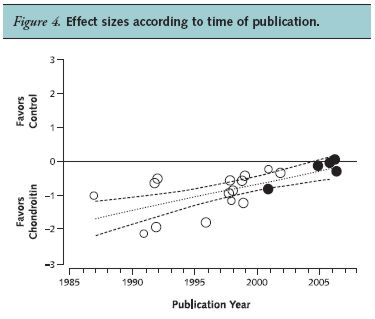
The authors conclude “Use of chondroitin in routine clinical practice should therefore be discouraged.”
Analyses by ConsumerLab.com has reported that 8 out of 20 products said to contain chondroitin failed its quality tests, with four containing between 0% and 8% of amount stated on the label.
Glucosamine shows a similar trend. Glucosamine is a synthetic chemical, but it is not a licensed medicine in the UK. It is marketed as a “food supplement”, not as a drug. It is not approved for precription on the NHS. The latest Cochrane review does not entirely rule out some benefit, but again the effects seem to get smaller as the trials get better.
Thanks to Quackwatch for the alert about the Reichenbach paper.
This is reposted from the old IMPROBABLE SCIENCE page
The British Medical Journal (2007, 337, 508 – 509) held a debate on whether or not CAM should be referred for evaluation to the National Institute for Clinical Excellence (NICE) [see it here]. Two of the comments that followed the debate were as follows
|
John R King, Consultant Psychiatrist David Colquhoun (“NICE should not have to evaluate alternative medicine”) makes a better case than Linda Franck et al. Space researchers do not, after all, waste time trying to disprove the beliefs of flat- earthists. Neither would it be helpful for a Nobel prizewinning chemist to stride into a church and denounce the holy water there as nothing more than H2O. There is a very large and ever expanding array of alternative treatments, some more bizarre than others, which could tie up the resources of NICE for an indefinite period. But if people want to believe in them – or in fairies or leprechauns – they should be left in peace to do so. It is no concern of scientific medicine. |
|
David Colquhoun, UCL Nobody is proposing to ban fairies or leprechauns. It would be both undesirable and impossible. There does seem to be a case, though, for not providing leprechauns at the tax payers’ expense. And really all leprechauns that are sold to the public should have labels that don’t make false claims for their powers. Unfortunately the MLRA (Medicines and Leprechauns Regulatory Agency) has let us down in the matter of labelling. I suspect infiltration of the Department of Health by little green men |
Channel 4 TV, Monday 12th March. This is the title of the Channel 4 TV documentary, Dispatches.
Lord Wedderburn, QC, a life peer and Emeritus Professor of Law at the London School of Economics, tells the programme:
“If, in fact, nothing changed and he became King, then there would be a most almighty fuss and controversy, and eventually the whole fabric of the constitutional monarchy could be threatened.”
The Prince’s Foundation for Integrated Health (FIH) is the Prince’s lobby group which attempts to make the hard-pressed NHS spend more money on unproven and disproved treatments. The FIH publishes “Complementary Healthcare: a Guide for Patients”. This document is not just barmy, but positively dangerous. In the rebuttal of the programme on the FIH web site, they claim that they do not promote alternative medicine, but elsewhere on the site they state their aim as “makes safe and effective complementary therapies available to patients in conjunction with conventional healthcare”.
Which would be all very well if they didn’t consistently ignore the evidence for effectiveness.
The MHRA recently, for the first time, betrayed its brief to nake sure that medicines work and are safe. This action has been condemned by just about every professional organisation. Nobody knows exactly what caused them to lose their heads in this way, but it is clear that they were under pressure from both the Department of Health and from the Prince of Wales. The Department of Health is clearly sympathetic to quackery, as shown by the letter below, and by their refusal to allow alternative medicine to be referred to NICE for assessment.
| The MHRA admit to having had at least seven letters form the Prince of Wales, and we know that an MHRA member has met the Prince at Clarence House at least once. But all the contents are secret from the public. The Chairman of the MHRA Agency Board, Prof Alasdair Breckenridge, and chairman of their Herbal Medicines committee, Prof Philip Routledge, have both admitted to me to having had pressure from the Prince of Wales, but neither will give any details, despite having been condemned by their own professional organisation, the British Pharmacological Society. | 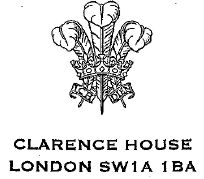 |
The Pharmacological Society’s statement read thus.
| The British Pharmacological Society believes that any claim made for a medicine must be based on evidence, and that it is the duty of the regulatory authorities, in particular the MHRA, to ensure that no claims can be made for the efficacy of any form of medicine unless there is good evidence that the claim is true. Despite many years of investigation, we have no convincing scientific evidence that homeopathic remedies work any better than placebo. Pharmacologists have noted frequently that most homeopathic products are diluted to the extent that they contain no molecule of active ingredient, that is, no medicine, which is highly misleading to consumers who are unlikely to recognise the expression “30C” for example. Furthermore, there are serious concerns, even in cases where they are used for minor ailments, that officially endorsed use of such remedies may put patients at risk of delayed diagnosis. The Society is therefore surprised that the national rules scheme for licensing homeopathic products, which came into force on 1 September (Statutory Instrument 2006 1952), will regard non-scientific data as evidence of efficacy. |
An excellent article on this topic was published by Rose in The Biologist, British health care regulation moves away from science.
The appalling treatment of Professor Edzard Ernst
| Edzard Ernst was the UK’s first professor of complementary medicine, and he is rather unusual in that field because he is totally honest, and very careful about evidence (something that has not always endeared him to the alternative medicine industry).
A letter was sent from Clarence House to the vice-chancellor of Exeter University, Steve Smith. The letter alleged a breach of confidence by Ernst. Having been sent a draft of the Smallwood report, Ernst was so horrified by the scientific standards in that document, he felt obliged, in the public interest, to speak out about it. Ernst was contacted by a newspaper, which had a copy of the draft, and described the initial findings as “outrageous and deeply flawed”. He added: “It is based on such poor science, it’s just hair-raising. The Prince … also seems to have overstepped his constitutional role” |
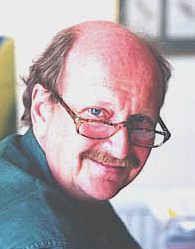
Prof Edzard Ernst. |
Prof Ernst was doing exactly what academics are meant to do. As a result he was subjected to a very prolonged disciplinary procedure, and for a year it was not obvious whether he’d keep his job. For a Prince, in a constitutional monarchy, to put pressure on a university to silence a conspicuously honest academic is just not acceptable.
The Prince of Wales behaviour was bad enough, but, to be generous, he is perhaps, a well-meaning but poorly educated man, filling in his time as best he can.
| In the story of Edzard Ernst, the behaviour of the Vice-Chancellor of Exeter University, Prof Steve Smith seems to me to be unforgivable. Instead of supporting his staff, and supporting academic freedom, he appeared to cower before the Clarence House letterhead. After keeping Prof Ernst on tenterhooks for an entire year he eventually deigned not to fire him in the most grudging and unpleasant way imaginable. |
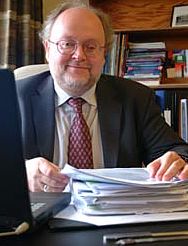 Prof. Steve Smith, Vice chancellor. |
That is illustrated by the end of Smith’s letter to Professor Ernst on 13th October 2006. It was shown on the TV programme, and is reproduced below.

Click to enlarge
The Daily Mail also has features on the healthiness of HRH’s own food lines, after his criticism of MacDonalds, Dutchy Original Sins, and here.
They are worth reading because the advice comes from Catherine Collins, a real dietician, not a nutribollocks guru.
Some responses The story was reported round the world.
Max Hastings (Guardian)
“To make good use of evidence, it is essential to possess not only intelligence, but a capacity for disciplined analysis. The prince has considerable virtues, a good heart notable among them. But he has always lacked discipline in his life and in his treatment of issues. Again and again, he gets himself into trouble by seeking to address matters that are, frankly, beyond his intellectual reach.”
This post has been transferred from the old IMPROBABLE SCIENCE page.
Two interesting papers. One shows popular anti-oxidant ‘supplements’, beta carotene, and vitamins A and D, far from making you live longer, have the opposite effect. Another shows that garlic does not lower cholesterol. And some publicity for Dan Hurley’s book, Natural Causes. An update looks at the activities of the supplements industry spokesperson. Dr Ann Walker, who seems sometimes to forget to declare her interests.
First let’s reiterate the myth of antioxidants
Nutribollocks: the antioxidant myth
“Nutritional supplements” are one of the most profitable scams (see, for example, Healthwatch, Quackwatch, and Holfordwatch).
There is a nice article by Lisa Melton on The Antioxidant Myth: a medical fairy tale in tne New Scientist (and see here), [download as pdf] . Here are some quotations.
| Cranberry capsules. Green tea extract. Effervescent vitamin C. Pomegranate concentrate. Beta carotene pills. Selenium. Grape seed extract. High-dose vitamin E. Pine bark extract. Bee spit.You name it, if it’s an antioxidant, we’ll swallow it. According to some estimates around half of US adults take antioxidant pills daily in the belief that they promote good health and stave off disease. . . . In 1992 researchers at the US National Cancer Institute set about testing beta carotene. The trial was set to run for 6 years, but two-thirds of the way through the researchers pulled the plug after discovering, to their surprise and horror, that those taking supplements were doing worse than the controls. They had developed 28 per cent more cases of lung cancer, and their overall death rate was 17 per cent higher. It’s a similar story with the world’s most popular antioxidant. Vitamin E shot to fame in the early 1990s, after two large studies involving more than 127,000 people in total found that those with a diet high in vitamin E were significantly less likely to suffer cardiovascular disease. Use of vitamin E supplements soared. In 1990, almost nobody took vitamin E; by the end of the decade an estimated 23 million US citizens were knocking back daily doses. |
“Treatment with beta carotene, vitamin A, and vitamin E may increase mortality”
That is the conclusion of a recent paper in the Journal of the American Medical Association, “Mortality in Randomized Trials of Antioxidant Supplements for Primary and Secondary Prevention” Systematic Review and Meta-analysis”, [Get the full text].
This isn’t original research, but a meta analysis that attempts to collate existing data taking into account the reliability of each source. The aim was to analyze the effects of antioxidant supplements (beta carotene, vitamins A and E, vitamin C [ascorbic acid], and selenium) on deaths (from any cause) in adults. The analysis seems to have been done well, and the results are startling. They aren’t just a waste of money, but some of them are actually bad for you. In 47 low-bias trials with 180 938 participants, beta carotene increased death rates by 7 per cent, vitamin A by 16 per cent, and vitamin E by 4 per cent (when taken separately). Vitamin C gave contradictory results and selenium showed no detectable effect.
This work got an excellent write-up in The Times, by their health correspondent, Nigel Hawkes. This was followed by a predictably silly defence of nutribollocks by the Times’ Dr Thomas Stuttaford (known in Private Eye as Dr Utterfraud). Luckily, this was neutralised by a second piece on the same page by Nigel Hawkes, “Phooey. Sensible balanced diet is the best investment”:
“ In nutrition, a plausible idea and a little bit of evidence are all that is needed to create a market. And such is the megaphone of marketing and the influence of countless “healthy eating” articles that these ideas, even the half-baked ones, can lodge very firmly in the national psyche.”
It’s a nice coincidence that this study came out while I was reading Dan Hurley’s book, Natural Causes (see below). This book sets out dramatically the harm, sometimes serious harm, that untested “supplements” have done to some individuals. But for me the most interesting part is the revelation of the political lobbying by this $20 billion supplement industry, with the aim (largely successful) of undermining the FDA and escaping from any effective regulation of its absurd, but exceedingly profitable, claims. The supplements industry puts the Prince of Wales in the shade when it comes to subverting common sense and good science.
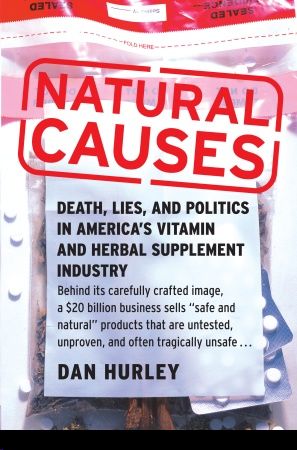
The Health Supplements Information Service (HSIS)
Needless to say, the supplements industry has already organised vilification of this excellent bit of work.
According to their web site,
“HSIS is funded by The Boots Company PLC, Bayer PLC, Perrigo, Seven Seas Ltd and Wyeth Consumer Healthcare. The campaign is co-ordinated by PAGB (Proprietary Association of Great Britain)”.
So it’s no surprise that their spokesperson. Dr Ann Walker, immediately tried to discredit the study, saying “The results of these mixed-sample metaanalyses are worthless” (The Times).
This same Ann Walker recently wrote and editorial in the British Journal of General Practice (January 2007). The editorial concludes “Although still considered to be controversial by some, taking a daily multinutrient supplement would bridge the gap between intake and requirements and ensure that nutrient target intakes are met.” But in this editorial her affiliation is given as Senior Lecturer in Human Nutrition, University of Reading. No mention at all of her role as spokesperson for the Supplements industry. Tut tut.
Patrick Holford too
Needless to say, supplement salesman Patrick Holford has weighed into the vilification. His objections have been dealt with nicely on the cutely named web site stopholfordtalkingrubbish.blogspot.com. Find the answers here.
Holford is the man who, in the BMJ said “Competing interests: none declared”, when promoting his supplements.
No interests? Holford himself has said
“any product, be it a publication, seminar, food or supplement, that is authored/invented by me has my name on it and earns me a royalty/payment. That is how I live and fund my research.”
So what about the galaxy of supplements being sold at “Health products for Life”? They say “we only supply supplements, foods and drinks that are recommended by nutrition expert, Patrick Holford.” And at the bottom of the page it says “©Copyright 2007 Holford and Associates. All Rights Reserved”. Companies House lists the sole shareholder in ‘Health Products for Life’ as P.J. Holford.
Garlic is no good either
Another interesting recent paper has appeared in Archives of Internal Medicine
Garlic is widely promoted as a cholesterol-lowering agent, but the evidence so far has been lousy. In this trial, 192 adults with low-density lipoprotein cholesterol (LDL-C) concentrations of 130 to 190 mg/dL (3.36-4.91 mmol/L) were randomly assigned to one of the following four treatment arms: raw garlic, powdered garlic supplement, aged garlic extract supplement, or placebo.
“Conclusions None of the forms of garlic used in this study, including raw garlic, when given at an approximate dose of a 4-g clove per day, 6 d/wk for 6 months, had statistically or clinically significant effects on LDL-C or other plasma lipid concentrations in adults with moderate hypercholesterolemia.”
Another purveyor of nutribollocks who has been dissected and exposed by Ben Goldacre. His views on AIDS are a menace to humanity. And, incredibly his course has been accredited by the University of Bedfordshire (formerly known as the University of Luton).
Read full entry on the original IMPROBABLE SCIENCE page.
On Monday 5 Feb 2007, the BBC ran a piece entirled Alternative therapy put on trial. It started
“An experiment in allowing NHS patients easier access to alternative and complementary therapies has been launched by NI Secretary Peter Hain.”
| But it is NOT a trial, and NOT an experiment. Journalists seem incapable of understanding the meaning of these words, and the result is irresponsible reports (though one might detect a hint of irony in the picture that the BBC used to illustrate acupuncture; right). |
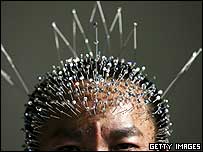 |
There is nothing new in the failure of journalists to distinguish good science from junk. We saw this very clearly in the case of the phoney fish oil “trials” going on in Durham (see Ben Goldacre’s account of these).
In the case of Durham the effect is to use public money to produce bad evidencethat can be used to promote the dubious claims of a private company, in the case “Eye Q” pills made by Equazen.
In the case of Northern Ireland, £200,000 of taxpayers’ money will be paid to a private company, GetwellUK, GPs in two areas will be able to refer patients for therapies like acupuncture, homeopathy and massage. Nothing there about seeing whether the treatments work! But Peter Hain seems to think he knows the answer already. He said
“I am certain, as a user of complementary medicine myself, that this has the potential to improve health substantially,”
He was “delighted that Northern Ireland is leading the way in integrating complementary and alternative therapies into the National Health Service”
Peter Hain used to be something of a hero to me. In the 70s his work for the Anti-apartheid movement was an inspiration (see his autobiographical notes). Now he has sunk to promoting junk science. Very sad.So what is Hain’s attitude to alternative medicine, and how did he come to ally himself with the batty medical opinions of the Prince of Wales? On his web site he had a section on this topic. For some reason it has now been deleted, but thanks (again) to Google’s cache, here is a quotation from a speech he made to The Prince of Wales Foundation for Integrated Health (12th October 2005).
|
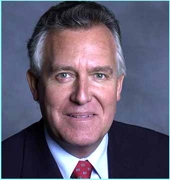 Peter Hain now 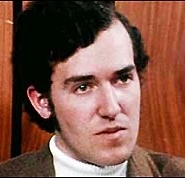 Peter Hain in 1970 |
So instead, we turned to complementary medicine. And with the help of homeopathy and tight restrictions on the sort of food that our son could eat – avoiding in particular wheat and milk products- both ailments went away.”
Hang on! You changed diet and gave homeopathic sugar pills. And that is a reason for the taxpayer to fund homeopathy? Any fool can see that this anecdote means that either (a) change in diet helped, (b) homeopathy helped, or (c) the eczema would have got better anyway. According to the National Eczema Society, “60-70% of children are virtually clear of the condition by the time they reach their mid-teens”. They “grow out” of it. Evidently a First Class Honours Degree in Economics and Political Science is not enough to teach Peter Hain what constitutes evidence and what does not.
On the other hand, the in the same speech Peter Hain also said
“I would certainly never advocate the squandering of public money on so called treatments that have no proven benefits and which take money away from existing therapies that are shown to work.”
But they have “no proven benefits”. Just how inconsistent can you get?
Who are GetwellUK?
GetwellUK is a private company financed largely by taxpayers’ money. And guess who supports it? The Prince of Quacks, once again exerting his unconstitutional influence on public policy. This is done partly through yet another of the Prince’s lobby groups, “GP Associates” (report in BMJ). It seems that “GP Associates” was the forerunner of the recently-launched “Integrated Health Associates”. The inaugural meeting of Integrated Health Associates” was sponsored by a drug company, Solgar Vitamins, a purveyor of unnecessary ‘supplements’ that is a trading arm of Boots Herbal Stores (no connection with that other well-known purveyor of misleading information, Boots the Chemists).
The Company says Support came from the government in February 2005 when the Parliamentary Under-Secretary for the Department of Health, Melanie Johnson, said in the House of Commons, “I thank the hon. Gentleman for notice of the question in relation to Get Well UK. We understand the benefit that many people get from complementary therapies. Local commissioning is a matter for local discretion, but we can see the benefits to local practices of an intermediary pulling together a range of services in the area for alternative medical treatments.” [Hansard].
“We were delighted to be selected as one of the first investees of Futurebuilders – a Treasury fund established to assist capacity building in community organisations who deliver public sector services. The investment will help Get Well UK to serve more NHS patients.”
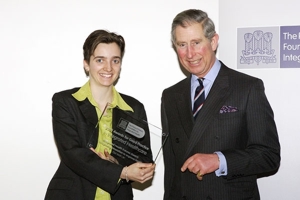
Prince of Wales with Boo Armstrong (Managing director of Getwell UK)
GetWellUK publish an evaluation of a “pilot project” in London, “Does it Work?”, by Nicola Robinson (Head of the Centre for Complementary Healthcare & Integrated Medicine,Thames Valley University).
The report tells us nothing whatsoever about the effectiveness of the treatments, because the “pilot” study was not designed to do so. It is 40 pages of waffle.
The report also says “Get Well UK is a not for profit organisation established in response to a recommendation by the House of Lords in 2000 that complementary therapies should be made available through the NHS. This is a gross misrepresentation of the House of Lords report which said this should be done ONLY if the treatments worked better than placebo. And, with very few exceptions, that still remains to be shown.
For their efforts in setting back medicine to the 19th century, they have had money from UnLtd Ventures (“provides consultancy support to a number of outstanding social entrepreneurs” and taxpayers’ money from Futurebuilders. And they are getting £200 000 of taxpayers’ money from Paul Goggins, the Northern Ireland Health Secretary
At the end of the “pilot scheme” there will have been no proper assessment of the effectiveness of the treatments. We shall be none the wiser.
BBC’s You and Yours programme (a lunchtime consumer programme) ran a good piece on “Helps Stop Snoring”, a dubious herbal “remedy” for snoring. They picked up the story from my site. Listen to the programme [mp3 file]
“Helps stop snoring” claims to work on the basis of a clinical trial. But the trial is flawed in many ways. In addition the author, Dr Andrew Prichard, seems to have quite forgotten to mention that a Helen Prichard who lives at the same address holds 2000 shares in the company that makes this wonder cure. [transferred from old improbable science page].
My pharmacological curiosity was stirred by a TV advertisement for a spray that, it was claimed, could stop you snoring. It’s hardly a life threatening condition, but it can be marriage-threatening. But what’s in it, and does it work?
A visit to the web site of Essential Health Products Limited looks promising. Their claim is this.
“CLINICAL TRIALS
Many products claim to have undergone tests, but Helps Stop Snoring is the only natural snoring remedy in the UK have undergone to a full, double blind clinical trial, conducted by a practicing Ear,Nose and Throat Consultant Surgeon.
Lasting over 18 months, the trial involved 140 snorers and their partners, and the results showed a headline success rate of 82%. The trial was conducted by Andrew Pritchard FRCS, Ear Nose and Throat Consultant at the Royal Shrewsbury Hospital and one of the UK`s leading specialists in the field of snoring and sleep disorders.
In a further first for a snore remedy the results of the trial were published in Phytology Research, an international journal, in October 2004.”
This claim was not so easy to check because the manufacturer mis-spells both the name of the author and the name of the journal. The paper in question seems to be this. Prichard AJ., The use of essential oils to prevent snoring Phytother Res. 2004 18(9), 696-9 [get the pdf].
Sadly this paper is not very convincing. The paper does describe the work as “preliminary”, but the manufacturer’s web site does not. There’s a surprise. For those who are interested, here are a few details.
|
140 adult snorers were recruited to the study via a snoring clinic. Snorers were randomly allocated to receive a metered dose of “Stop snoring “gargle, “Stop snoring ” spray or placebo gargle (there was no placebo spray at all). It isn’t obvious what placebo could mimic the peppermint, lemon, clove, thyme, eucalyptus and pine oils that the “remedy” contains (among other things). Their concentrations aren’t stated. The paper makes no mention of what was used as placebo, but Dr Prichard tells me “The content of the placebo could not be an essential oil. I have been told by the manufacturer that we used a sugar type mix”. Actually it contained water, sodium saccharin, polysorbate 20, potassium sorbate and citric acid. It would be have been obvious tor the patient whether they got the placebo or not.
|
|
The comparison that is made is before and after in each treatment group, rather than comparing the groups. The eminent statistician, Stephen Senn, has some trenchant criticisms of this sort of experimental design.
Senn points out that “Having made the mistake of using the within treatment group to baseline comparison he ought to then use the Wilcoxon signed ranks test rather than the rank sum but he doesn’t say which”. The results are pretty odd too. In the placebo group, 4 out of 11 patients show a big reduction in snoring severity (Fig. 4). In the spray group, a smaller proportion, 5 out of 28 show a big improvement (Fig 2). The changes in the rest of the patients are mostly very small, but there are more slight improvements in the spray group than in the placebo group. The percent of patients that “improve” (by any amount, however small, is therefore bigger in the spray group than control, but the difference in mean snoring severity was much smaller
Financial interests in the snoring study
Sadly, it is essential to consider vested interests in drug assessment, as I have noted below (and here, and here). Prichard’s paper states openly that it was “Sponsored by Essential Health Products Ltd, 4 Top Farm Barns, Pitchford, Shropshire, SY5 7DW, UK.” That doesn’t mean it’s wrong, though the bias associated with sponsorship is well known,
But there is no mention of shareholdings

Companies House will, only £1, sell you company reports. The records show that Helen Jane Prichard, holds 2000 shares in Essential Health Products Ltd.
Is this just a coincidence of names? I think not. If you look up. Dr Andrew Prichard in the phone book, you see that his address is exactly the same as that of Helen Jane Prichard.
Oh dear: looks like yet another undisclosed financial interest in a clinical study.
Many thanks to the inimitable Ben Goldacre fot the totally over-the-top link to this item: it has done wonders for my hit rate.
Boots the Chemists is selling the same stuff True to their philosophy of making money and never mind the evidence, the “Boots Alternatives” range of snake oil products has, for £14.99, exactly the same stuff. They claim the Boots |
 |
Enquiries to Boots about this product have not been answered or have been answered inaccurately. See also below for Boots miseducation pages.
And here’s the ironical bit. Boots web site makes a big point about CSR (Corporate Social Responsibility). (Thanks to Sean
Kehoe for spotting this.)
“TRUST BOOTS
As you may have noticed, that’s the tagline which in 2005 we adopted as the sign-off to all our advertising. But it’s much more than just a slogan. It’s a concise statement of our entire corporate strategy. Our aim is to make Boots the world’s best health and beauty retailer, and we’re 100% clear that the unique trust in which we are held provides the key to achieving this. Which means, of course, that those two words are also the rationale for all our CSR activities. Everything we do that builds trust is good for our business; anything which could compromise it, a risk we can’t afford to take.”
Trust Boots to provide straight answers.
They must be joking.
One of the zaniest bit of quantum bollocks of all time. Sigh,.
Read full entry on the original IMPROBABLE SCIENCE page.
The BBC2 Newsnight programme, in an excellent bit of investigative journalism, has shown that an ex-arms dealer, Michael Hart Jones has conned the Swaziland government with his claims to cure AIDS with a useless and probably dangerous treatment for AIDS based on goat serum.
Read full entry on the original IMPROBABLE SCIENCE page.



